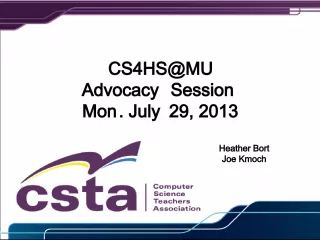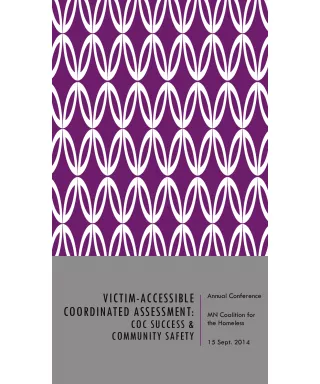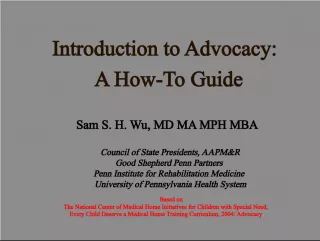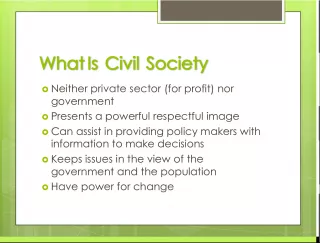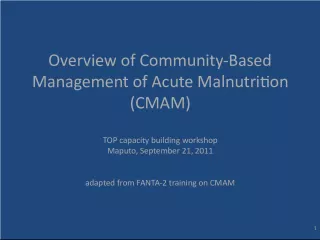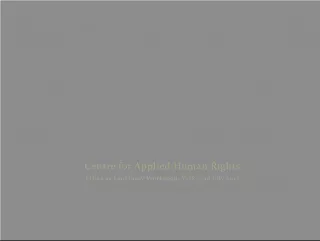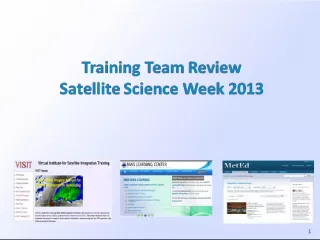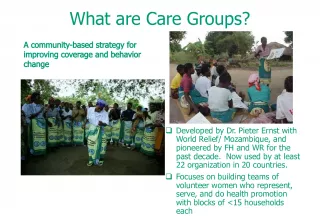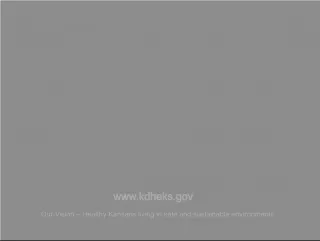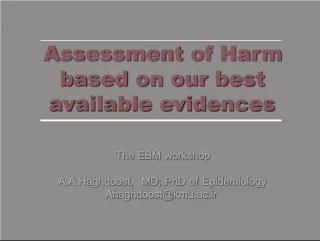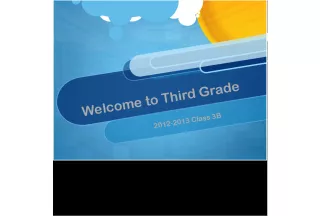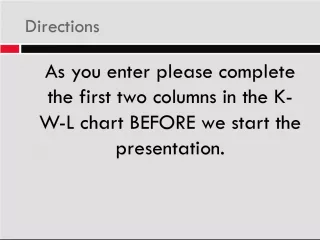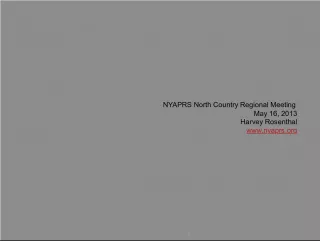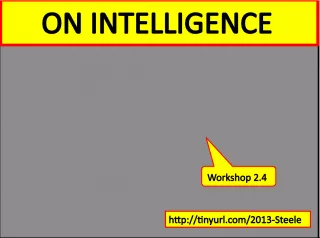Advocacy and Coalition Building Workshop at Healthy Caribbean Conference 2008 in Barbados
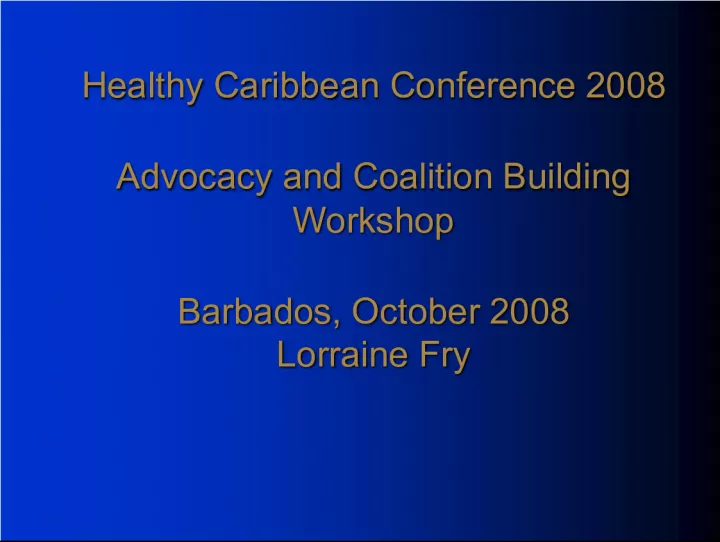

The Advocacy and Coalition Building Workshop held at the Healthy Caribbean Conference 2008 in Barbados was organized by Lorraine Fry. The workshop focused
- Uploaded on | 4 Views
-
 osipa
osipa
About Advocacy and Coalition Building Workshop at Healthy Caribbean Conference 2008 in Barbados
PowerPoint presentation about 'Advocacy and Coalition Building Workshop at Healthy Caribbean Conference 2008 in Barbados'. This presentation describes the topic on The Advocacy and Coalition Building Workshop held at the Healthy Caribbean Conference 2008 in Barbados was organized by Lorraine Fry. The workshop focused. The key topics included in this slideshow are . Download this presentation absolutely free.
Presentation Transcript
Slide1Healthy Caribbean Conference 2008 Advocacy and Coalition Building Workshop Barbados, October 2008 Lorraine Fry Healthy Caribbean Conference 2008 Advocacy and Coalition Building Workshop Barbados, October 2008 Lorraine Fry
Slide2Advocacy and Coalition Building Workshop Advocacy and Coalition Building Workshop Agenda: 1. Introduction (5 mins) 2. Presentations by co-leaders (35 mins.) - definition of topic - examples of use of effective use of tools and approaches 1. Questions and Answers (10 mins.) 2. Participants’ discussion (35 mins.) - sharing experiences of examples of tools used and ways in which tools could be more effectively used 1. Final comments and summary (5 mins.)
Slide3Advocacy and Coalition Building Workshop Advocacy and Coalition Building Workshop Objectives: 1. To demonstrate and discuss tools and approaches available to, and successfully used by, civil society, to bring about change 2. To provide a forum for participants to share and exchange their experiences in the application of the tools for change 3. Discuss ways in which participants may enhance the use of the tools and approaches within their organizations, countries and the region
Slide4Advocacy and Coalition Building Advocacy and Coalition Building Definition of Advocacy: Active support for a cause, policy or legislation with the express goal of influencing opinion and mobilizing action Aims to influence those who make decisions Can be local, regional, nationwide, international Can be direct (asking in person) or indirect (influencing public opinion through the media) Many different approaches to achieve goals
Slide5Advocacy and Coalition Building Advocacy and Coalition Building Key Questions: 1. What do we want? 2. Who can give it to us? 3. What do they need to hear? 4. Who do they need to hear it from? 5. How can we get them to hear it?
Slide6Advocacy and Coalition Building Advocacy and Coalition Building What do we want? What is our goal? (Define the problem; define the solution) Is the goal specific enough? Is our goal realistic? Is it winnable/achievable? Is this the right time? Do we have the appropriate time-frame?
Slide7Advocacy and Coalition Building Advocacy and Coalition Building Who can give us what we want? Decision makers and influence figures (opinion leaders) are the target audience of advocacy efforts The more you know about the decision- makers, the greater the likelihood of success
Slide8Advocacy and Coalition Building Advocacy and Coalition Building What do they need to hear? The core message: - what we want to achieve - why we want to achieve it - how it can be achieved - what specific action you want them to take
Slide9Advocacy and Coalition Building Advocacy and Coalition Building Who do they need to hear it from? People who are credible, trustworthy, well- received (have influence) Credible people are well-researched and are known for their expertise in the subject People of influence and/or high standing can get you in the door, and carry weight People who represent a large number of other people
Slide10Advocacy and Coalition Building Advocacy and Coalition Building Who do they need to hear it from? Credible people who are well-researched and are known for their expertise in the subject People of influence and/or high standing can get you in the door, and carry weight People who represent a large number of other people Working in coalitions and partnerships allows you to recruit additional messengers
Slide11Advocacy and Coalition Building Advocacy and Coalition Building How can we get them to hear it? Meetings and negotiations with elected officials and their staff (lobbying) Meetings with civil servants on policy issues Identify potential champions and leaders; build strategic relationships Provision of information and analysis to decision makers
Slide12Advocacy and Coalition Building Advocacy and Coalition Building How can we get them to hear it? News media (earned media): contacting reporters, editorial board visits, news releases, news conferences Paid media (mass media – radio/TV ads) Campaign media: brochures, posters, bulletins Internet communications Promotions: buttons, t-shirts, stickers
Slide13Advocacy and Coalition Building Advocacy and Coalition Building How can we get them to hear it? Building broad and diverse coalitions – numbers count in a democracy Organized letter writing campaigns to elected officials Organized local lobbying visits to elected officials by their constituents Grass roots activities such as demonstrations and rallies
Slide14Advocacy and Coalition Building Advocacy and Coalition Building Additional Key Questions: 1. What have we got? 2. What do we need to develop? 3. How do we begin? 4. How do we tell if it’s working?
Slide15Advocacy and Coalition Building Advocacy and Coalition Building 1. What have we got? Identify strengths, weaknesses re: financial and human resources, trained spokespeople, key allies, public awareness Who do we have to do the work and do we have any money to spend, and if so is it adequate for the task at hand?
Slide16Advocacy and Coalition Building Advocacy and Coalition Building 2. What do we need to develop? Strategies to achieve the goal educational resources (brochures, fact sheets, posters, etc.) Media strategy (goal, target audience, message, method of delivery) and trained spokespeople strategic alliances; build coalition relationships with media, politicians, civil servants
Slide17Advocacy and Coalition Building Advocacy and Coalition Building 3. How do we begin? Develop overall strategic plan of action Establish timelines and specific goals within those timelines Establish minimum budget need to accomplish goals Map of assets and needs Identify the opposition, ways to counter
Slide18Advocacy and Coalition Building Advocacy and Coalition Building 4. How do tell if it’s working? Have we built alliances, partnerships (coalitions or otherwise?) Have we managed to reach and influence the decision-makers, media public? Is there measurable progress towards achieving the goals
Slide19Advocacy and Coalition Building: Working in Coalitions Advocacy and Coalition Building: Working in Coalitions Coalition is a group of individuals and/or organizations united around a common issue or goal Short-term goal: campaign for new policy or law Common interest: quasi-trade associations, national voluntary organizations Institutional partnerships: ongoing policy development and representation (i.e., chronic disease alliances with Heart, Lung and Cancer Societies)
Slide20Advocacy and Coalition Building: Working in Coalitions Advocacy and Coalition Building: Working in Coalitions Reasons for Coalitions: When advocacy goal requires resources or activities that your organization cannot manage alone When there is support for a cause in diverse organizations who are not otherwise able to undertake a campaign When there are several organizations involved in the issue, and consistency in strategies is desired
Slide21Advocacy and Coalition Building: Working in Coalitions Advocacy and Coalition Building: Working in Coalitions Advantages of Coalitions: Increases resources, and allows economic use of shared resources Increases visible support for goal Creates a common front and consistent messages Educates and mobilizes concerned citizens and groups Expand reach of campaign
Slide22Advocacy and Coalition Building: Working in Coalitions Advocacy and Coalition Building: Working in Coalitions Challenges of Coalitions: Sharing control Balancing goals and needs of coalition and of member organizations Sharing credit and visibility Differing cultures and constraints Differing strategies
Slide23Advocacy and Coalition Building: Working in Coalitions Advocacy and Coalition Building: Working in Coalitions Managing Coalitions Requires: Desire to set and achieve common goal Respect for each others self-interest Willingness to make decisions together Give and take
Slide24Advocacy and Coalition Building: Campaign for Effective Warnings Advocacy and Coalition Building: Campaign for Effective Warnings In 1999, Canada’s Health Minister had been criticized for a number of decisions by his government favouring the tobacco industry He needed to re-position himself as a public health leader on tobacco He decided to strengthen Canada’s warnings and made his announcement in that year He released a Discussion Paper proposing to increase space for package text-based warnings from about the top 35% to the top 60%, front and back of the package No pictures or graphics were proposed
Slide25Advocacy and Coalition Building: Campaign for Effective Warnings Advocacy and Coalition Building: Campaign for Effective Warnings A national coalition – The National Tobacco OR Kids Campaign was formed to advocate for effective picture- based warnings 130 Canadian organizations endorsed the Tobacco OR Kids campaign and began letter-writing campaign to MPs and visits to their offices The coalition leaders designed a totally new warning system, which they called the Black Box project The Black Box contained 6 mock-up packages with proposed picture-based warnings
Slide26Advocacy and Coalition Building: Campaign for Effective Warnings Advocacy and Coalition Building: Campaign for Effective Warnings The Black Box was released by the Tobacco OR Kids campaign at a press conference Copies of these proposed packages sent to all Members of Parliament This helped garner media and political support for use of pictures in warnings Brochures on effective warnings systems were sent to health groups across the country, who were asked to visit their MPs
Slide27Advocacy and Coalition Building: Campaign for Effective Warnings Advocacy and Coalition Building: Campaign for Effective Warnings Opposition by the tobacco industry was strong Their arguments: - not technically possible in Canada for them to print pictures as part of colour warnings - new warnings would not be effective at decreasing smoking - warnings constituted an expropriation of their packaging - cost to the industry would be millions of dollars
Slide28Advocacy and Coalition Building: Campaign for Effective Warnings Advocacy and Coalition Building: Campaign for Effective Warnings Media was used to counter tobacco industry arguments; the health side won Health Minister announced in 2000 new package warning system – 16 rotated picture-based warnings occupying the top 50% of the front and back of the package Images included a lung with a cancer tumour, a brain after as stroke, a damaged heart, a diseased mouth, and a limp cigarette as part of a message on impotence
